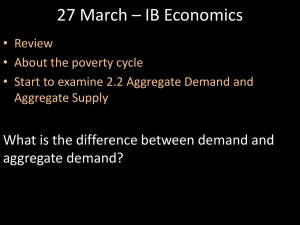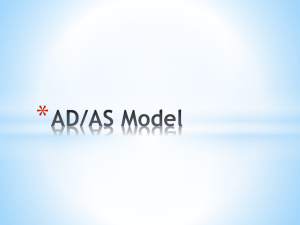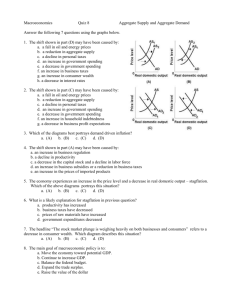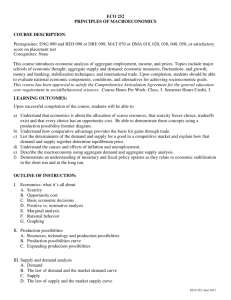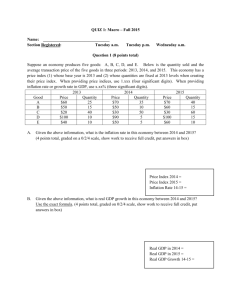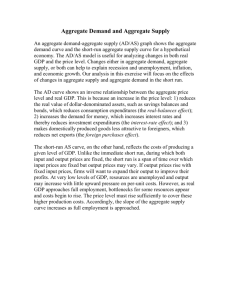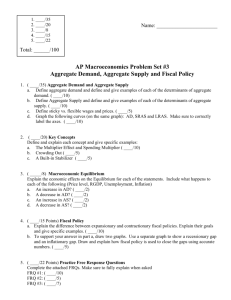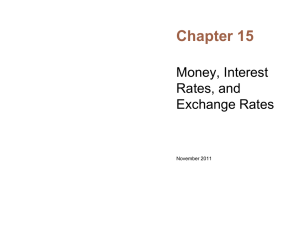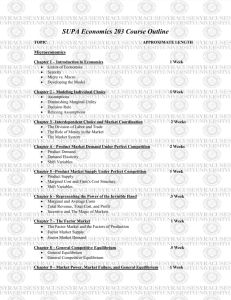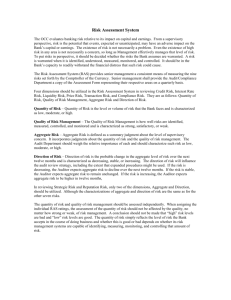Aggregate Demand And Supply 01-12 Class 1
advertisement
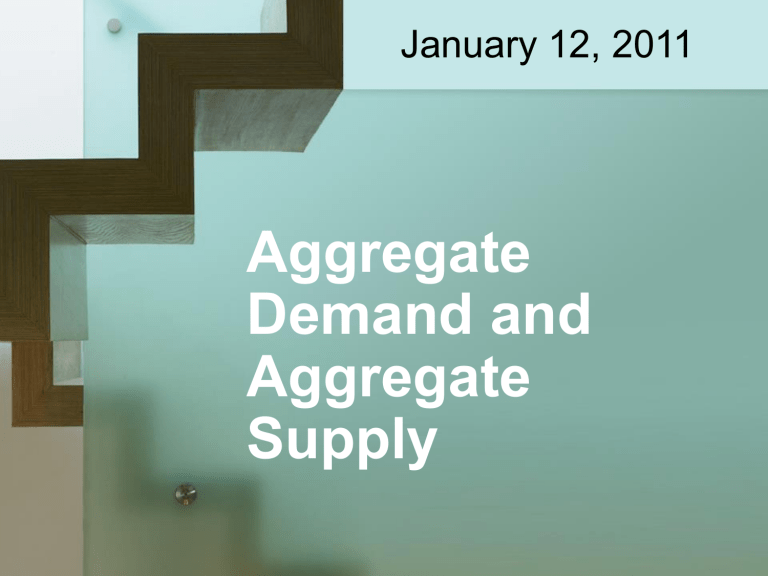
January 12, 2011 Aggregate Demand and Aggregate Supply Aggregate Demand • Amount of real GDP purchased at each price level • Why the downward slope? –Real-balances effect –Interest-rate effect –Foreign purchases effect • Consumption, investment, and net exports 2 Price Level Aggregate Demand Curve Aggregate Demand AD Real Domestic Output, GDP 3 Aggregate Demand • Determinants of aggregate demand – Fixed variables along the demand curve • Change in fixed variable • Multiplier effect • Consumer spending variables: – Consumer wealth – Consumer expectations – Household borrowing – Personal taxes 4 Aggregate Demand • Investment spending variables –Real interest rates –Expected returns • Future business conditions • Technology • Degree of excess capacity • Business taxes 5 Aggregate Demand • Government spending • Net export spending variables • National income abroad • Exchange rates 6 Changes in Aggregate Demand Price Level Increase in Aggregate Demand Decrease in Aggregate Demand AD2 AD1 AD3 Real Domestic Output, GDP 7 Aggregate Supply • Amount real GDP produced at each price level • Three time horizons • Immediate short run –Few days to a few months –All prices fixed –Implicit price agreements –Contractual agreements 8 Price Level Aggregate Supply ASISR Immediate-shortrun Aggregate Supply Qf Real Domestic Output, GDP 9 Aggregate Supply • Short run –Input prices fixed –Output prices variable –Real profit changes • Long run –All prices variable –Full employment GDP –All prices adjust 10 Aggregate Supply Slope not constant: per unit production cost and firm capacity Price Level Aggregate Supply (Short Run) 0 Qf Real Domestic Output, GDP 11 Aggregate Supply Price Level ASLR Long-run Aggregate Supply Qf Real Domestic Output, GDP 12 Aggregate Supply • Determinants of aggregate supply • Change in input price – Domestic resource prices – Prices of imported resources • Change in productivity • Change in legal-institutional environment – Business taxes and subsidies – Government regulation 13 Aggregate Supply AS3 AS1 AS2 Price Level Decrease in Aggregate Supply Increase in Aggregate Supply Real Domestic Output, GDP 14 Equilibrium Real Output Demanded (Billions) Price Level (Index Number) Real Output Supplied (Billions) $506 108 $513 508 104 512 510 100 510 512 96 507 514 92 502 Equilibrium Price Level and Equilibrium Real GDP 15 Equilibrium Price Level AS Equilibrium 100 92 a b AD 502 510 514 Real Domestic Output, GDP (Billions of Dollars) 16 Changes in Equilibrium Increase in Aggregate Demand Price Level AS Demand-Pull Inflation P2 P1 AD1 AD Qf Q1 Q2 Real Domestic Output, GDP 17 Changes in Equilibrium Decrease in Aggregate Demand Price Level AS b P1 a c P2 Creates a Recession AD1 AD2 Q1 Q2 Q f Real Domestic Output, GDP 18 Changes in Equilibrium • Decrease in aggregate demand – Recession and cyclical unemployment – Deflation? • Downward price inflexibility: – Fear of price wars – Menu costs – Wage contracts – Morale, effort, and productivity • Efficiency wages – Minimum Wage 19 Changes in Equilibrium Decrease in Aggregate Supply Price Level AS2 Cost-Push Inflation P2 P1 AS1 b a AD Q1 Q f Real Domestic Output, GDP 20 Changes in Equilibrium Increases in Aggregate Supply – Full-Employment With Price-Level Stability Price Level AS1 P3 P2 P1 AS2 b c a AD2 AD1 Q1 Q2Q3 Real Domestic Output, GDP 21
